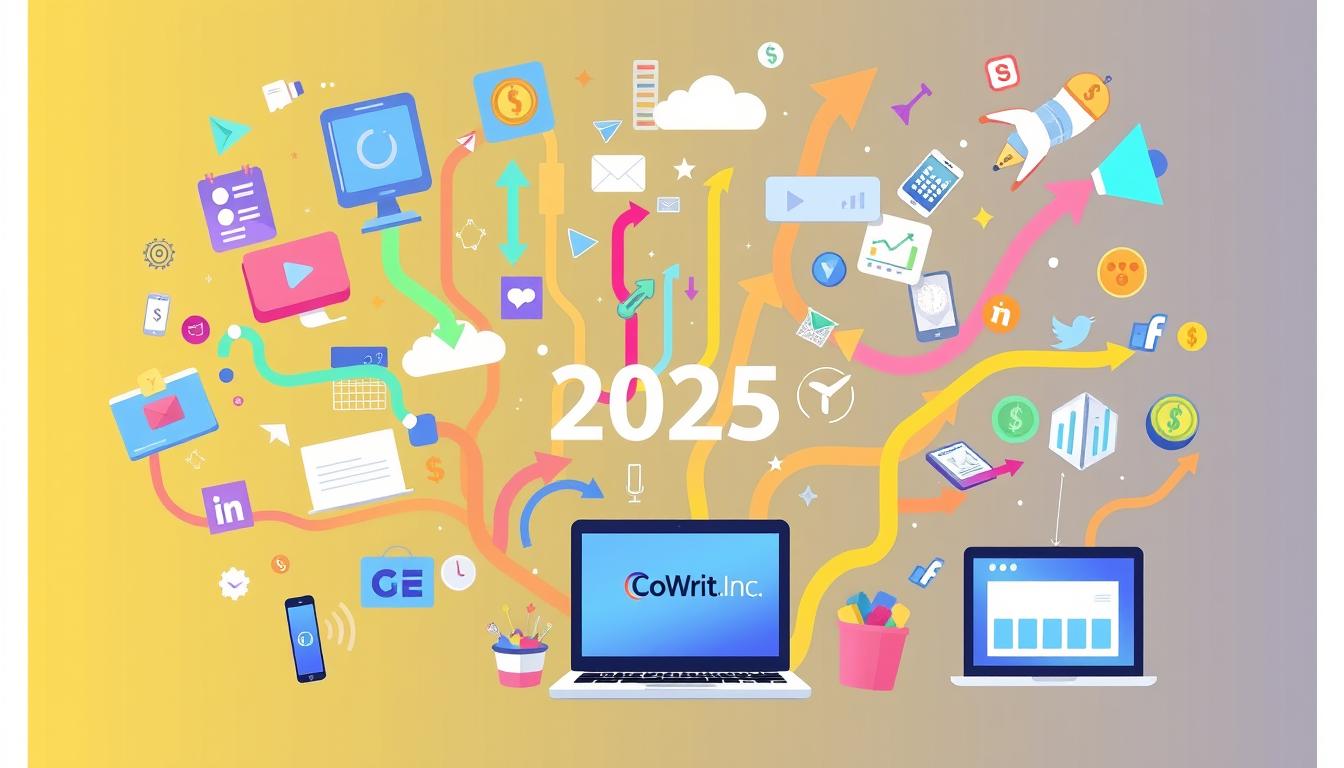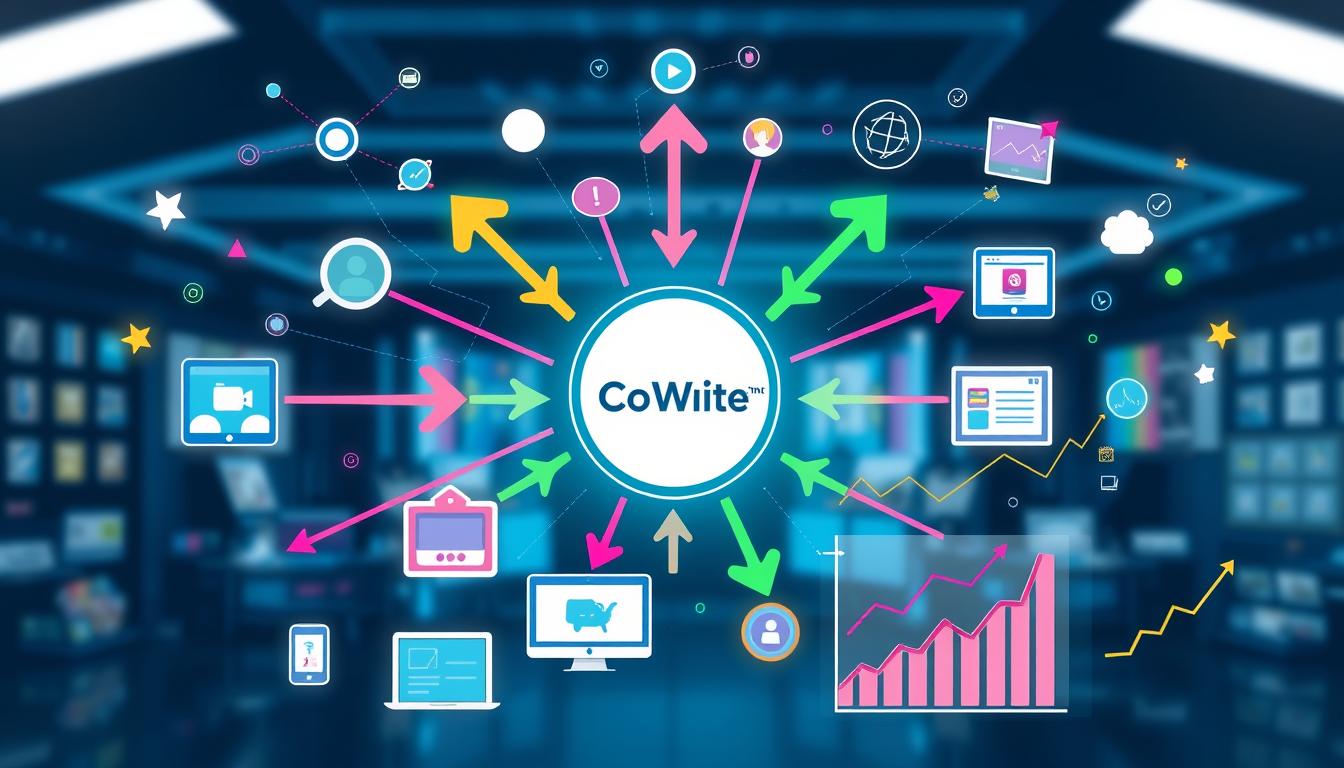Affiliate marketing is a big deal in today’s fast-changing digital world. It lets brands and entrepreneurs reach a global market worth over $12 billion. This guide will teach you how to make money online through affiliate marketing in 2025.
Affiliate marketing is simple. Brands pay affiliates for bringing in customers. As an affiliate, you promote products and earn commissions. It’s a win-win for you, the brand, and the customer.
The world of affiliate marketing is booming. 79% of online companies use affiliates to promote their products. Also, 65% of affiliates use blogging to get traffic. This shows great opportunities for content creators and influencers to make money.
Key Takeaways:
- Affiliate marketing is a $12 billion global industry, with the US market accounting for $6.8 billion.
- Successful affiliate publishers can earn up to $10,000 per day through commission-based revenue streams.
- Affiliate marketing can deliver up to 30% of a brand’s total revenue, with an average ROI of $15 for every dollar spent.
- The rise of influencer partnerships and video content will shape the future of affiliate marketing in 2025.
- Leveraging SEO and social media strategies are key to driving traffic and conversions for affiliate marketing success.
What is Affiliate Marketing and How It Works?
Affiliate marketing is a way for digital entrepreneurs to make money by promoting products. It’s a partnership between an affiliate and a merchant. The affiliate shares links on sites like blogs or social media.
When someone buys through these links, the affiliate gets a commission.
Key Players in Affiliate Marketing
The main players in affiliate marketing are:
- Affiliates: People or businesses that promote products for a commission.
- Advertisers: Companies that offer affiliate programs to promote their products.
- Consumers: People who buy through affiliate links.
- Affiliate platforms: Services that connect affiliates and advertisers, helping with tracking and payments.
How Earnings are Generated
Affiliate marketing pays based on performance, like sales or clicks. Advertisers now offer different payment options. They give more for actions like subscriptions or big-ticket buys.
| Affiliate Marketing Payment Structure | Description | Potential Earnings |
|---|---|---|
| Cost per Sale (CPS) | Affiliates earn a commission for each successful sale referred through their affiliate link. | Commissions typically range from 5% to 30% of the product’s price, with higher-priced items offering larger payouts. |
| Cost per Lead (CPL) | Affiliates are paid for generating qualified leads, such as email sign-ups or form submissions. | Commissions can range from a few dollars to hundreds, depending on the advertiser’s lead value. |
| Cost per Click (CPC) | Affiliates earn a small fee for each click on their affiliate link, regardless of whether a sale is made. | Earnings per click are generally low, ranging from a few cents to a few dollars, but can add up with high-volume traffic. |
Why Choose Affiliate Marketing?
Affiliate marketing is a strong way to make money online. It lets businesses and people earn passive income streams and explore diverse monetization strategies. This model is great because it rewards you based on your performance. It’s a good choice for those wanting to grow their online presence.
Low Startup Costs
Starting with affiliate marketing is easy and cheap. You don’t need a lot of money to begin. This makes it perfect for entrepreneurs, freelancers, and hobbyists who want to earn extra.
Flexibility and Freedom
Affiliate marketing gives you a lot of freedom. You can pick what products to promote. This lets you work on things you love and know well. You can make a plan that fits your audience and goals.
Potential for Passive Income
The best thing about affiliate marketing is the chance to make passive income. By making good content and sharing links, you can keep earning money even when you’re not working. This can give you a steady income, letting you focus on other things.
| Affiliate Marketing Statistics | Value |
|---|---|
| Affiliate marketing spending surpassed $9.5 billion in 2023 | $9.5 billion |
| Affiliate marketing industry is predicted to grow by 63%, reaching nearly $38 billion by 2027 | $38 billion |
| Affiliate marketing currently accounts for 16% of all online orders in the US | 16% |
| Twenty percent of brand marketers consider affiliate marketing their most successful marketing channel | 20% |
Affiliate marketing is popular because it’s cheap to start, flexible, and can lead to passive income. It’s a great way for individuals and businesses to grow online and make money. By using this method, you can find new ways to succeed financially.

Popular Affiliate Marketing Models
Affiliate marketing uses different models to pay affiliates. Each model has its own way of paying for work done. Brands pay affiliates for their help in reaching customers, from first seeing an ad to making a purchase. Here are some top affiliate marketing models:
Pay-per-Sale (PPS)
In the pay-per-sale model, affiliates get paid for each sale they help make. This model encourages affiliates to promote products that sell well. They earn a percentage of the sale, which can be up to 50% or more, depending on the product.
Pay-per-Click (PPC)
The pay-per-click model pays affiliates for each visitor they send to a website. This model is great for increasing website traffic and brand awareness. The pay is usually lower than in PPS programs.
Pay-per-Lead (PPL)
In the pay-per-lead model, affiliates get paid for each lead they generate. This could be an email signup or a form submission. It’s a key model for performance-based marketing campaigns focused on getting valuable leads.
| Affiliate Marketing Model | Payout Structure | Commission Rates |
|---|---|---|
| Pay-per-Sale (PPS) | Commission per successful sale | Typically 5-50% |
| Pay-per-Click (PPC) | Commission per website visit | Typically 0.01-1.00 USD per click |
| Pay-per-Lead (PPL) | Commission per qualified lead | Typically 5-50 USD per lead |
These affiliate marketing models let brands set up custom payment plans. They can pay for different actions, like first click or conversion path participation. This way, affiliates get paid for their work in the customer journey, from awareness to purchase.
Selecting the Right Affiliate Programs
Starting in affiliate marketing means picking the right programs to promote. This choice greatly affects your earnings and success. You need to look at commission rates, find your niche, and check the program’s reputation.
Evaluating Commission Structures
The commission rate is a big deal. High rates might look good, but think about your earnings potential. Sites like ShareASale, CJ Affiliate, Impact, and Rakuten Marketing offer many programs. This lets you pick the best one for your affiliate program selection.
Finding Your Niche
Choosing the right affiliate programs for your niche is key. Find products or services that match your audience. This approach boosts your credibility and conversion rates.
Assessing Program Reputation
The program’s reputation matters a lot. Look into their history, customer feedback, and support. Check their website, social media, and how well they integrate with your site. This helps you see if they’re professional and committed to their affiliates.
| Affiliate Program | Commission Rates | Niche Relevance | Reputation |
|---|---|---|---|
| Amazon Associates | 1-10% | Diverse products | Established, reliable |
| Clickbank | 1-75% | Digital products | Extensive program, variable quality |
| Commission Junction (CJ) | 1-30% | Broad range of industries | Reputable, enterprise-level |
| Rakuten Advertising | 1-20% | Retail, travel, and more | Trusted, global network |
By carefully looking at these factors, you can choose the best affiliate programs. This will help you earn more and succeed in affiliate program selection and niche marketing.

“Affiliate marketing can be a powerful tool for earning commissions, but it’s essential to choose the right programs that align with your niche and audience.”
Building Your Affiliate Marketing Platform
To succeed in affiliate marketing, start with a solid online base – a website or blog. Website optimization and the right tools are crucial. They help make your platform engaging and profitable.
Choosing the Right Website or Blog
First, set up a WordPress blog with a reliable domain provider like GoDaddy or Namecheap. Choose a fast, secure hosting service like Rocket.net or Cloudways. Pick a lightweight, responsive theme, such as GeneratePress or Blocksy, for the best performance and user experience.
Essential Tools and Resources
- Affiliate link management plugins to track and manage your links
- SEO tools for better content optimization and search visibility
- Analytics software to monitor your site’s performance and affiliate marketing efforts
Optimizing for User Experience
Make sure your website loads fast, is mobile-friendly, and easy to use. Focus on a smooth user experience to boost conversions and keep visitors interested. Regularly check your site’s performance and tweak it to keep improving your affiliate marketing platform.
| Affiliate Marketing Platform | Key Features | Potential Earnings |
|---|---|---|
| WordPress Blog |
|
Thousands of dollars per month |
| ClickBank Marketplace |
|
Up to $1,000 per sale |
| Social Media Platforms |
|
Thousands of dollars per month |
“Affiliate marketing has become a powerful tool for entrepreneurs and businesses to expand their reach and generate additional revenue streams. By building a robust online platform and leveraging the right affiliate marketing tools, you can unlock new opportunities for growth and financial success.”
Creating Compelling Content for Affiliates
In the world of affiliate marketing, making great content is crucial. It drives traffic, generates leads, and earns commissions. Knowing your audience and using SEO can help you create content that resonates and ranks well.
Types of Content that Convert
There are many types of content that work well in affiliate marketing. Each type has its own way to grab your audience’s attention. Here are some of the most effective ones:
- Product reviews: Honest looks at products or services, covering their good and bad points.
- How-to guides: Step-by-step guides that solve problems and offer valuable info.
- Comparison posts: Detailed comparisons of similar products or services to help readers decide.
- Personal experience stories: Sharing your own experiences can build trust and show your expertise.
Understanding Your Audience
To make content that converts, you must know your audience well. Do market research, look at your competition, and learn about your audience’s needs and likes. Tailor your content to meet their specific needs to grab their attention and earn their trust.
Leveraging SEO for Traffic
To get your content seen by the right people, you need to optimize it for search engines. Start by finding the keywords your audience uses, then use them naturally in your content. Use on-page optimization like meta tags and internal linking to improve your search visibility. Also, get high-quality backlinks to your content to boost your SEO.
By making compelling content that focuses on your audience and using SEO, you can succeed in affiliate marketing in 2025 and beyond.

Promoting Your Affiliate Links Effectively
As an affiliate marketer, it’s key to promote your links well to make sales and earn commissions. Use many tactics like social media, email campaigns, and paid ads to reach more people and make a bigger impact.
Social Media Strategies
Social media is a great way to show off your affiliate products. Find out where your audience likes to hang out online, like Instagram or Twitter. Then, make content that shows how great your products are. Use stories, posts, and team up with influencers to get your message out there and send people to your links.
Email Marketing Techniques
Having a good email list is very valuable in affiliate marketing. Use emails to build a relationship with your audience and share products that fit their interests. Write messages that are personal and show the special things about the products you’re promoting. Good email marketing can help you sell more and earn more money.
Paid Advertising Options
Use paid ads to help your free promotion efforts. Sites like Google Ads and Facebook Ads let you target specific groups of people. Try different ads and see what works best for your business.
Always be open about your affiliate links to keep your audience’s trust. By using many ways to promote and being honest, you can make more money and grow your affiliate business.
| Affiliate Network | Commission Rates | Notable Features |
|---|---|---|
| Amazon Associates | 1% to 10% | Vast product selection, global reach |
| ClickBank | Up to 75% | High commissions on digital products |
| ShareASale | Varies | Thousands of affiliate programs across niches |
| CJ Affiliate | Varies | Options in diverse industries, from retail to technology |
The secret to great affiliate link promotion is to add value to your audience. Use a mix of social media, email, and paid ads to do this.
Tracking Your Affiliate Marketing Success
As an affiliate marketer, it’s key to watch your performance and make smart choices based on data. Use strong analytics tools and track important performance metrics. This helps you see what’s working and what needs work.
Tools for Monitoring Performance
Google Analytics is a top tool for performance tracking in affiliate marketing. It lets you see website traffic, user actions, and how your affiliate links are doing. Many affiliate programs also have their own dashboards and reports. These give you a clear picture of your earnings, clicks, and conversions.
Key Metrics to Consider
- Click-through Rate (CTR): See how many users click on your affiliate links. This shows how well your content and promotions are doing.
- Conversion Rate: Watch how many clicks turn into sales or leads. This helps you find top-performing products and campaigns.
- Average Order Value (AOV): Keep an eye on the average value of each sale. This helps you aim for higher-value customers.
- Total Revenue: Look at your total earnings from affiliate marketing. This shows how well you’re doing and helps plan for growth.
Adjusting Strategies for Better Results
Check your analytics often to spot trends and chances to get better. Focus on the products or content that bring in the most performance and revenue. On the other hand, improve or stop things that don’t do well. This keeps your efforts in line with your goals and audience.
By using analytics tools and watching your performance metrics closely, you can make smart choices. This helps you fine-tune your strategies and boost your affiliate marketing success over time.
![]()
Common Mistakes to Avoid in Affiliate Marketing
Starting your affiliate marketing journey? Watch out for common mistakes that can slow you down. One big one is overlooking your audience’s needs. Instead of just pushing products, focus on adding real value to your followers. Know what they need, want, and like, and make content that meets those needs.
Another mistake is neglecting compliance with program guidelines. Following FTC rules and being open about your affiliate ties is key. It keeps you honest and avoids legal trouble. Make sure you know the rules of the programs you join.
Lastly, ignoring analytics is a big no-no. Keep an eye on your numbers like clicks, conversions, and earnings. This helps you see what’s working and what’s not. Use this info to make your marketing better and earn more.
Overlooking Audience Needs
- Prioritize providing value over just promoting products
- Understand your audience’s pain points and preferences
- Create content that addresses your followers’ concerns
Lack of Compliance with Guidelines
- Familiarize yourself with FTC regulations for affiliate marketing
- Disclose affiliate relationships clearly and transparently
- Adhere to the guidelines set by your affiliate programs
Ignoring Analytics
- Monitor key performance metrics like click-through and conversion rates
- Analyze data to identify areas for improvement and optimization
- Use data-driven decision-making to refine your affiliate marketing strategies
Avoid these affiliate marketing pitfalls to succeed. With the right approach, you can earn more in the future.
“Successful affiliate marketing requires a deep understanding of your audience and a commitment to compliance. Ignoring these critical elements can seriously undermine your efforts.”
Future Trends in Affiliate Marketing
The world of affiliate marketing is always changing. Businesses and marketers need to keep up with new trends to find great opportunities. One big trend is influencer marketing. More brands are working with influencers to sell their products and get more people to know about them.
Also, people love watching videos more than reading text. About 72% of folks prefer videos to learn about something new. If you use videos in your marketing, you’ll grab your audience’s attention better. They’re 95% more likely to remember what you want them to do after watching a video, compared to just 10% from text.
New tech like artificial intelligence (AI) and machine learning will change affiliate marketing a lot. These tools can make your campaigns better, suggest personalized content, and target your audience more accurately. As the industry grows by 10% every year, using these technologies will help you stay ahead and succeed in affiliate marketing.



